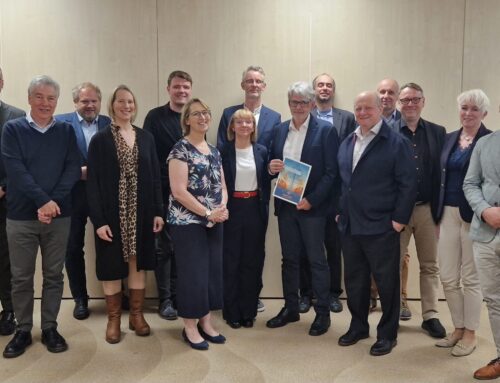
Holzindustrie Schweighofer’s clarifications regarding the FERN Report
With regard to the report put together by green NGO FERN, analyzing how the increasing need for biomass impacts Europe’s forestlands, we would like to bring the following clarifications regarding our activities.
Holzindustrie Schweighofer provides a responsible and efficient manner of processing wood, as well as a sustainable way of sourcing biomass. We harness every part of the raw material used in the technological process. Thus, not only does the company use round wood to produce high value added lumber products (95 % of our lumber is being furtherprocessed into glue lam products, profile boards, block boards, egde glued panels etc.) , but it also brings value to wood residues, by turning them into pellets (at Sebes, Radauti, Reci and Comanesti) and briquettes (at Siret and Sebes). This complete capitalization of the raw material is possible due to the state-of-the art technology we use in our factories and to our commitment to avoid wasting an important renewable resource of the country.
We believe that EU’s objectives to increase biomass energy production should not be seen as a pressure on forests, but as a real necessity to become more responsible and efficient in order to make the most of our natural resources. Removing timber residues from a forest does not compromise the health of the soil or the wildlife habitat and puts no pressure on forestlands. If left there, timber residues would start decaying and release carbon into the atmosphere, thus impacting the climate. Burning the biomass has therefore the same impact on the climate as decaying on the forest ground and is climate neutral. The removal of biomass is done carefully and not extensively. Regarding the speculations of using quality wood as biomass, this would not be economy-wise, since the added value gained from producing timber and semi-fabricated products is much higher than the value that could be gained by producing energy. Holzindustrie Schweighofer does not produce pellets or briquettes out of round wood. Only wood residues from saw milling operations (wooden chips, sawdust and shavings) are being used for this purpose.
Furthermore, because the FERN report briefly presents other past accusations brought against HS, we would like to clarify them with the following statements.
1. Ministry of Environment investigations
Following investigations conducted by the Romanian Ministry of Environment at our factories, a report was drafted which, according to the legal procedures in Romania, was sent to the Prosecutor’s Office. Because we have not yet received any copy of this report and we do not know its content, we cannot comment on the information that it might include.
2. EIA footage
With regard to the video released this year by the Environment Investigation Agency (EIA), in which two representatives of Holzindustrie Schweighofer are shown, we would like to mention again that their statements were taken out of context. Although we have requested the entire video recording from the producers, we haven’t received the footage, which proves that it was simply an attempt to manipulate the public opinion. However, even in the statements included in the materials, the company’s representatives do not say at any given moment that they accept illegal wood, but only that they accept a higher volume of raw material, which is absolutely normal and benefic in any business context, as long as it complies with all legal provisions. Moreover, the bonuses offered by Holzindustrie Schweighofer are for all the suppliers that fulfil all the provisions of the contract. Our bonification system is transparently presented on our website, at this link: https://www.schweighofer.at/fileadmin/files/all_ro/Conditii/Conditii_Generale_de_Achizitie_Bustean_-_Holzindustrie_Schweighofer_SRL.pdf
3. Impact on the furniture industry
Over 70% of the total forests area in Romania is represented by broadleaves, especially oak and beech, which are the main raw materials used in the furniture industry, together with MDF chipboards. Softwood, on the other hand, is used mostly in the construction sector, not in the furniture industry. Thus, the softwood timber processing industry is not responsible for the lack of raw material or the bankruptcies of furniture producers after 1990.
In reality, the existence of the woodworking industry ensures the production of the furniture industry, for producers that want to buy timber. We mention, as well, that 95% of the Holzindustrie Schweighofer’s products are products with added-value, a large part of them being sold directly in Romania, including to furniture factories.
4. The new Forest Code
Holzindustrie Schweighofer would never engage into actions that might put pressure on any of the company’s social, economic or political partners. We, however, expressed our concerns as one of the parties directly impacted by the Code, with regard to certain provisions of the new draft law. We believe that limiting the free movement of goods is against the principles supported by the European Union. The Forest Code is dedicated to regulate responsible and sustainable management of forests in Romania, and competition issues should not be the scope of this law. Upon request from us, the Romanian Competition Council itself addressed a letter to us confirming that such a limitation is infringing Romanian and European competition law as well as the free movement of goods.
Through its fair and responsible way of doing business, Holzindustrie Schweighofer is contributing to Romania’s development and progress. The company’s profits are constantly reinvested in Romania to create new jobs, to generate more added value and to ensure the optimal use of the raw material. Holzindustrie Schweighofer believes that the whole of societyprofits by encouraging and recognizing the benefits of the woodworking industry, and the responsible processing of its renewable raw materials.
We reiterate our openness to dialogue and cooperation with all parties interested in discussing any issue related to the woodworking industry and we are willing to engage in any initiatives that aim at improving the situation of forests.
We can provide you with additional details and answers, should you have any further questions related to our activities.
Holzindustrie Schweighofer hopes to establish a strong and fruitful dialogue with FERN and any other green NGOs interested, in order to provide them with information related to our activities and our commitment in a sustainable and legal sourcing of wood resources.
Schweighofer is operating 3 sawmills and 2 further processing plants in Romania. The total investment amounts to 778 Mio EUR since 2002. We are currently employing 2,900 people in Romania and process 3.6 Mio cbm softwood logs annually out of which 1 Mio cbm are imported.
Related Posts
Contact
EUROPEAN ORGANISATION
OF THE SAWMILL INDUSTRY AISBL
Rue Montoyer 24/box 20
BE-1000 Brussels
Tel.: +32 2 287 08 68
Email: info@eos-oes.eu



